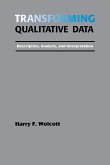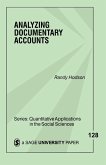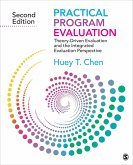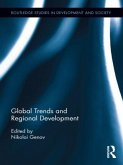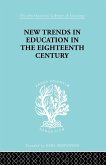Contemporary Trends in Evaluation Research
Herausgeber: Coryn, Chris L S; Westine, Carl
Contemporary Trends in Evaluation Research
Herausgeber: Coryn, Chris L S; Westine, Carl
- Broschiertes Buch
Andere Kunden interessierten sich auch für
![Transforming Qualitative Data Transforming Qualitative Data]() Harry F WolcottTransforming Qualitative Data264,99 €
Harry F WolcottTransforming Qualitative Data264,99 €![Analyzing Documentary Accounts Analyzing Documentary Accounts]() Randy Dale HodsonAnalyzing Documentary Accounts51,99 €
Randy Dale HodsonAnalyzing Documentary Accounts51,99 €![The Hard-pressed Researcher The Hard-pressed Researcher]() Anne EdwardsThe Hard-pressed Researcher86,99 €
Anne EdwardsThe Hard-pressed Researcher86,99 €![Practical Program Evaluation Practical Program Evaluation]() ChenPractical Program Evaluation163,99 €
ChenPractical Program Evaluation163,99 €![Global Trends and Regional Development Global Trends and Regional Development]() Global Trends and Regional Development73,99 €
Global Trends and Regional Development73,99 €![New Trends Educ 18 Cent Ils 99 New Trends Educ 18 Cent Ils 99]() Nicholas A HansNew Trends Educ 18 Cent Ils 9969,99 €
Nicholas A HansNew Trends Educ 18 Cent Ils 9969,99 €![Evaluation of the Positive Behavior Support Program on Fourth-Grade Student Discipline Infractions Evaluation of the Positive Behavior Support Program on Fourth-Grade Student Discipline Infractions]() James A BracyEvaluation of the Positive Behavior Support Program on Fourth-Grade Student Discipline Infractions12,99 €
James A BracyEvaluation of the Positive Behavior Support Program on Fourth-Grade Student Discipline Infractions12,99 €-
-
-
Produktdetails
- Verlag: Sage Publications
- Four-Volume Set edition
- Seitenzahl: 1600
- Erscheinungstermin: 29. Oktober 2015
- Englisch
- Abmessung: 266mm x 131mm x 101mm
- Gewicht: 3239g
- ISBN-13: 9781446266373
- ISBN-10: 1446266370
- Artikelnr.: 40550845
Hinweis: Dieser Artikel kann nur an eine deutsche Lieferadresse ausgeliefert werden.
- Herstellerkennzeichnung
- Libri GmbH
- Europaallee 1
- 36244 Bad Hersfeld
- gpsr@libri.de
Chris L. S. Coryn, Ph.D., is the director of the Interdisciplinary Ph.D. in Evaluation (IDPE) program and assistant professor in the Evaluation, Measurement, and Research (EMR) program at Western Michigan University (WMU). He has published more than 100 peer-reviewed articles and several books on evaluation. He is the executive editor of the Journal of MultiDisciplinary Evaluation and serves on the editorial advisory board of the American Journal of Evaluation. Carl D. Westine, Ph.D., is an Assistant Professor of Educational Research in the Educational Technology and Foundations department at the University of West Georgia, where he teaches and advises graduate students in program evaluation and research methods. Carl is a graduate of the Interdisciplinary Ph.D. in Evaluation program at Western Michigan University. With a background in economics and statistics, he aims to improve the efficiency and effectiveness of evaluators through inspired teaching and research. His ongoing research efforts are focused on improving the designs of experimental and quasi-experimental evaluations and research studies in the fields of education and healthcare, professional development evaluations, and research on evaluation theories, methods, and practice.
Volume One
Part One: Contemporary Trends
Section One: Research on Evaluation Theory, Method, and Practice
Advancing Empirical Scholarship to Further Develop Evaluation Theory and
Practice - Christina Christie
Developing Standards for Empirical Examinations of Evaluation Theory -
Robin Miller
Research on Evaluation: A Needs Assessment - Michael Szanyi, Tarek Azzam
and Matthew Galen
Taking Stock of Empowerment Evaluation: An Empirical Review - Robin Miller
and Rebecca Campbell
Designing Evaluations: A Study Examining Preferred Evaluation Designs of
Educational Evaluators - Tarek Azzam and Michael Szanyi
A Systematic Review of Theory-Driven Evaluation Practice from 1990 to 2009
- Chris Coryn, Lindsay Noakes, Carl Westine and Daniela Schröter
Evaluator Characteristics and Methodological Choice - Tarek Azzam
Research on Evaluation Use: A Review of the Empirical Literature from 1986
to 2005 - Kelli Johnson, Lija Greenseid, Stacie Toal, Jean King, Frances
Lawrenz and Boris Volkov
Evaluation Use: Results from a Survey of U.S. American Evaluation
Association Members - Dreolin Fleischer and Christina Christie
Going through the Process: An Examination of the Operationalization of
Process Use in Empirical Research on Evaluation - Courtney Amo and J.
Bradley Cousins
An Empirical Examination of Validity in Evaluation - Laura Peck, Yushim Kim
and Joanna Lucio
Part Two: Emerging Issues
Section One: Visualizing Evaluation Data
Data Visualization and Evaluation - Tarek Azzam, Stephanie Evergreen, Amy
Germuth and Susan Kistler
GIS in Evaluation: Utilizing the Power of Geographic Information Systems to
Represent Evaluation Data - Tarek Azzam and David Robinson
Section Two: Communication
Unlearning Some of Our Social Scientist Habits - E. Jane Davidson
Reconceptualizing Evaluator Roles - Gary Skoltis, Jennifer Morrow and Erin
Burr
Volume Two
Part One: Methodological Developments
Section One: Perspectives on Validity
Validity Frameworks for Outcome Evaluation - Huey Chen, Stewart Donaldson
and Melvin Mark
Reframing Validity in Research and Evaluation: A Multidimensional,
Systematic Model of Valid Inference - George Julnes
Recommendations for Practice: Justifying Claims of Generalizability - Larry
Hedges
Section Two: Perspectives on Causality
Campbell and Rubin: A Primer and Comparison of Their Approaches to Causal
Inference in Field Settings - William Shadish
Contemporary Thinking about Causation in Evaluation: A Dialogue with Tom
Cook and Michael Scriven - Thomas Cook, Michael Scriven, Chris Coryn and
Stephanie Evergreen
Campbell's and Rubin's Perspectives on Causal Inference - Stephen West and
Felix Thoemmes
Evaluating Methods for Estimating Program Effects - Charles Reichardt
Reflections Stimulated by the Comments of Shadish (2010) and West &
Thoemmes (2010) - Donald Rubin
An Economist's Perspective on Shadish (2010) and West and Thoemmes (2010) -
Guido Imbens
Part Two: Empirical Developments
Section One: Quasi-Experiments that Resemble Experiments`
Three Conditions under Which Experiments and Observational Studies Produce
Comparable Causal Estimates: New Findings from Within-Study Comparisons -
Thomas Cook, William Shadish and Vivian Wong
Can Nonrandomized Experiments Yield Accurate Answers? A Randomized
Experiment Comparing Random and Nonrandom Assignments - William Shadish,
M.H. Clark and Peter Steiner
Comment: The Design and Analysis of Gold Standard Randomized Experiments -
Donald Rubin
Rejoinder - William Shadish, M.H. Clark and Peter Steiner
An Assessment of Propensity Score Matching as a Nonexperimental Impact
Estimator: Evidence from Mexico's PROGRESA Program - Juan Diaz and
Sudhanshu Handa
Examining the Internal Validity and Statistical Precision of the
Comparative Interrupted Time Series Design by Comparison with a Randomized
Experiment - Travis St. Clair, Thomas Cook and Kelly Hallberg
Section Two: Improving the Design of Cluster-Randomized Trials
Emergent Principles for the Design, Implementation, and Analysis of
Cluster-based Experiments in Social Science - Thomas Cook
Using Covariates to Improve Precision for Studies That Randomize Schools to
Evaluate Educational Interventions - Howard Bloom, Lashawn Richburg-Hayes
and Alison Black
Strategies for Improving Precision in Group-Randomized Experiments -
Stephen Raudenbush, Andres Martinez and Jessaca Spybrook
New Empirical Evidence for the Design of Group Randomized Trials in
Education - Robin Jacob, Pei Zhu and Howard Bloom
Intraclass Correlations and Covariate Outcome Correlations for Planning
Two- and Three-Level Cluster-Randomized Experiments in Education - Larry
Hedges and Eric Hedberg
The Implications of "Contamination" for Experimental Design in Education -
Christopher Rhoads
Stratified Sampling Using Cluster Analysis: A Sample Selection Strategy for
Improved Generalizations from Experiments - Elizabeth Tipton
Volume Three
Part One: Developments in Qualitative Methods
Section One: Advances in Qualitative Analysis Techniques
A General Inductive Approach for Analyzing Qualitative Evaluation Data -
David Thomas
Qualitative Comparative Analysis (QCA) and Related Systematic Comparative
Methods: Recent Advances and Remaining Challenges for Social Science
Research - Benoît Rihoux
A New Realistic Evaluation Analysis Method: Linked Coding of Context,
Mechanism, and Outcome Relationships - Suzanne Jackson and Gillian Kolla
A Proposed Model for the Analysis and Interpretation of Focus Groups in
Evaluation Research - Oliver Massey
Part Two: Developments in Mixed Methods
Section One: Defining Mixed Methods
Mixed Methods Research: A Research Paradigm Whose Time Has Come - R. Burke
Johnson and Anthony Onwuegbuzie
Toward a Methodology of Mixed Methods Social Inquiry - Jennifer Greene
Toward a Definition of Mixed Methods Research - R. Burke Johnson, Anthony
Onwuegbuzie and Lisa Turner
Integrating Quantitative and Qualitative Research: How Is It Done? - Alan
Bryman
Is Mixed Methods Social Inquiry a Distinctive Methodology? - Jennifer
Greene
Putting the MIXED Back Into Quantitative and Qualitative Research in
Educational Research and Beyond: Moving toward the Radical Middle - Anthony
Onwuegbuzie
Section Two: Mixed Methods Typologies
A General Typology of Research Designs Featuring Mixed Methods - Charles
Teddlie and Abbas Tashakkori
Conducting Mixed Analyses: A General Typology - Anthony Onwuegbuzie et al.
A Typology Of Mixed Methods Research Designs - Nancy Leech and Anthony
Onwuegbuzie
Section Three: Mixed Methods in Practice
Transformative Paradigm: Mixed Methods and Social Justice - Donna Mertens
Grounded Theory in Practice: Is It Inherently a Mixed Method? - R. Burke
Johnson, Marilyn McGowan and Lisa Turner
Communities of Practice: A Research Paradigm for the Mixed Methods Approach
- Martyn Denscombe
A Theory-Driven Evaluation Perspective on Mixed Methods Research - Huey
Chen
Mixed Methods and Credibility of Evidence in Evaluation - Donna Mertens and
Sharlene Hesse-Biber
Guidelines for Conducting and Reporting Mixed Research in the Field of
Counseling and Beyond - Nancy Leech and Anthony Onwuegbuzie
The Validity Issue in Mixed Research - Anthony Onwuegbuzie and R. Burke
Johnson
Mixed Data Analysis: Advanced Integration Techniques - Anthony Onwuegbuzie
et al.
Volume Four
Part One: Enduring Issues of Evaluation Practice
Section One: Metaevaluation
Quality, Context, and Use: Issues in Achieving the Goals of Metaevaluation
- Leslie Cooksy and Valerie Caracelli
Concurrent Meta-Evaluation: A Critique - Carl Hanssen, Franz Lawrenz and
Diane Dunet
Metaevaluation in Practice: Selection and Application of Criteria - Leslie
Cooksy and Valerie Caracelli
Evaluating the Quality of Self-Evaluations: The (Mis)match between Internal
and External Meta-Evaluation - Jan Vanhoof and Peter Van Petegem
Meta-Evaluation Revisited - Michael Scriven
Section Two: Ethics
Expanding the Conversation on Evaluation Ethics - Thomas Schwandt
The Good, the Bad, and the Evaluator: 25 Years of AJE Ethics - Michael
Morris
Ethics and Development Evaluation: Introduction - Patrick Grasso
Everyday Ethics: Reflections on Practice - Gretchen Rossman and Sharon
Rallis
Nonparticipant to Participant: A Methodological Perspective on Ethics -
Scott Rosas
Section Three: Using Program Theory in Evaluation
Constructing Theories of Change: Methods and Sources - Paul Mason and
Marian Barnes
Unpacking Black Boxes: Mechanisms and Theory Building in Evaluation - Brad
Astbury and Frans Leeuw
Using Programme Theory to Evaluate Complicated and Complex Aspects of
Interventions - Patricia Rogers
Part Two: Enduring Issues of Evaluation Training
Section One: Evaluation Capacity Building/Development
A Research Synthesis on the Evaluation Capacity Building Literature - Susan
Labin, Jennifer Duffy, Duncan Meyers, Abraham Wandersman and Catherine
Lesene
A Multidisciplinary Model of Evaluation Capacity Building - Hallie Preskill
and Shanelle Boyle
Measuring Evaluation Capacity - Results and Implications of a Danish Study
- Steffen Nielsen, Sebastian Lemire and Majbritt Skov
A Self-Assessment Procedure for Use in Evaluation Training - Daniel
Stufflebeam and Lori Wingate
Section Two: Evaluator Competence
Establishing Essential Competencies for Program Evaluators - Laurie
Stevahn, Jean King, Gail Ghere and Jane Minnema
Evaluator Competencies: What's Taught versus What's Sought - Jennifer
Dewey, Bianca Montrosse, Daniela Schröter, Carolyn Sullins and John Mattox
II
A Conversation on Cultural Competence in Evaluation - Joseph Trimble, Ed
Trickett, Celia Fisher and Leslie Goodyear
Development and Validation of the Cultural Competence of Program Evaluators
(CCPE) Self-Report Scale - Krystall Dunaway, Jennifer Morrow and Bryan
Porter
Emphasizing Cultural Competence in Evaluation: A Process-Oriented Approach
- Luba Botcheva, Johanna Shih and Lynne Huffman
Part One: Contemporary Trends
Section One: Research on Evaluation Theory, Method, and Practice
Advancing Empirical Scholarship to Further Develop Evaluation Theory and
Practice - Christina Christie
Developing Standards for Empirical Examinations of Evaluation Theory -
Robin Miller
Research on Evaluation: A Needs Assessment - Michael Szanyi, Tarek Azzam
and Matthew Galen
Taking Stock of Empowerment Evaluation: An Empirical Review - Robin Miller
and Rebecca Campbell
Designing Evaluations: A Study Examining Preferred Evaluation Designs of
Educational Evaluators - Tarek Azzam and Michael Szanyi
A Systematic Review of Theory-Driven Evaluation Practice from 1990 to 2009
- Chris Coryn, Lindsay Noakes, Carl Westine and Daniela Schröter
Evaluator Characteristics and Methodological Choice - Tarek Azzam
Research on Evaluation Use: A Review of the Empirical Literature from 1986
to 2005 - Kelli Johnson, Lija Greenseid, Stacie Toal, Jean King, Frances
Lawrenz and Boris Volkov
Evaluation Use: Results from a Survey of U.S. American Evaluation
Association Members - Dreolin Fleischer and Christina Christie
Going through the Process: An Examination of the Operationalization of
Process Use in Empirical Research on Evaluation - Courtney Amo and J.
Bradley Cousins
An Empirical Examination of Validity in Evaluation - Laura Peck, Yushim Kim
and Joanna Lucio
Part Two: Emerging Issues
Section One: Visualizing Evaluation Data
Data Visualization and Evaluation - Tarek Azzam, Stephanie Evergreen, Amy
Germuth and Susan Kistler
GIS in Evaluation: Utilizing the Power of Geographic Information Systems to
Represent Evaluation Data - Tarek Azzam and David Robinson
Section Two: Communication
Unlearning Some of Our Social Scientist Habits - E. Jane Davidson
Reconceptualizing Evaluator Roles - Gary Skoltis, Jennifer Morrow and Erin
Burr
Volume Two
Part One: Methodological Developments
Section One: Perspectives on Validity
Validity Frameworks for Outcome Evaluation - Huey Chen, Stewart Donaldson
and Melvin Mark
Reframing Validity in Research and Evaluation: A Multidimensional,
Systematic Model of Valid Inference - George Julnes
Recommendations for Practice: Justifying Claims of Generalizability - Larry
Hedges
Section Two: Perspectives on Causality
Campbell and Rubin: A Primer and Comparison of Their Approaches to Causal
Inference in Field Settings - William Shadish
Contemporary Thinking about Causation in Evaluation: A Dialogue with Tom
Cook and Michael Scriven - Thomas Cook, Michael Scriven, Chris Coryn and
Stephanie Evergreen
Campbell's and Rubin's Perspectives on Causal Inference - Stephen West and
Felix Thoemmes
Evaluating Methods for Estimating Program Effects - Charles Reichardt
Reflections Stimulated by the Comments of Shadish (2010) and West &
Thoemmes (2010) - Donald Rubin
An Economist's Perspective on Shadish (2010) and West and Thoemmes (2010) -
Guido Imbens
Part Two: Empirical Developments
Section One: Quasi-Experiments that Resemble Experiments`
Three Conditions under Which Experiments and Observational Studies Produce
Comparable Causal Estimates: New Findings from Within-Study Comparisons -
Thomas Cook, William Shadish and Vivian Wong
Can Nonrandomized Experiments Yield Accurate Answers? A Randomized
Experiment Comparing Random and Nonrandom Assignments - William Shadish,
M.H. Clark and Peter Steiner
Comment: The Design and Analysis of Gold Standard Randomized Experiments -
Donald Rubin
Rejoinder - William Shadish, M.H. Clark and Peter Steiner
An Assessment of Propensity Score Matching as a Nonexperimental Impact
Estimator: Evidence from Mexico's PROGRESA Program - Juan Diaz and
Sudhanshu Handa
Examining the Internal Validity and Statistical Precision of the
Comparative Interrupted Time Series Design by Comparison with a Randomized
Experiment - Travis St. Clair, Thomas Cook and Kelly Hallberg
Section Two: Improving the Design of Cluster-Randomized Trials
Emergent Principles for the Design, Implementation, and Analysis of
Cluster-based Experiments in Social Science - Thomas Cook
Using Covariates to Improve Precision for Studies That Randomize Schools to
Evaluate Educational Interventions - Howard Bloom, Lashawn Richburg-Hayes
and Alison Black
Strategies for Improving Precision in Group-Randomized Experiments -
Stephen Raudenbush, Andres Martinez and Jessaca Spybrook
New Empirical Evidence for the Design of Group Randomized Trials in
Education - Robin Jacob, Pei Zhu and Howard Bloom
Intraclass Correlations and Covariate Outcome Correlations for Planning
Two- and Three-Level Cluster-Randomized Experiments in Education - Larry
Hedges and Eric Hedberg
The Implications of "Contamination" for Experimental Design in Education -
Christopher Rhoads
Stratified Sampling Using Cluster Analysis: A Sample Selection Strategy for
Improved Generalizations from Experiments - Elizabeth Tipton
Volume Three
Part One: Developments in Qualitative Methods
Section One: Advances in Qualitative Analysis Techniques
A General Inductive Approach for Analyzing Qualitative Evaluation Data -
David Thomas
Qualitative Comparative Analysis (QCA) and Related Systematic Comparative
Methods: Recent Advances and Remaining Challenges for Social Science
Research - Benoît Rihoux
A New Realistic Evaluation Analysis Method: Linked Coding of Context,
Mechanism, and Outcome Relationships - Suzanne Jackson and Gillian Kolla
A Proposed Model for the Analysis and Interpretation of Focus Groups in
Evaluation Research - Oliver Massey
Part Two: Developments in Mixed Methods
Section One: Defining Mixed Methods
Mixed Methods Research: A Research Paradigm Whose Time Has Come - R. Burke
Johnson and Anthony Onwuegbuzie
Toward a Methodology of Mixed Methods Social Inquiry - Jennifer Greene
Toward a Definition of Mixed Methods Research - R. Burke Johnson, Anthony
Onwuegbuzie and Lisa Turner
Integrating Quantitative and Qualitative Research: How Is It Done? - Alan
Bryman
Is Mixed Methods Social Inquiry a Distinctive Methodology? - Jennifer
Greene
Putting the MIXED Back Into Quantitative and Qualitative Research in
Educational Research and Beyond: Moving toward the Radical Middle - Anthony
Onwuegbuzie
Section Two: Mixed Methods Typologies
A General Typology of Research Designs Featuring Mixed Methods - Charles
Teddlie and Abbas Tashakkori
Conducting Mixed Analyses: A General Typology - Anthony Onwuegbuzie et al.
A Typology Of Mixed Methods Research Designs - Nancy Leech and Anthony
Onwuegbuzie
Section Three: Mixed Methods in Practice
Transformative Paradigm: Mixed Methods and Social Justice - Donna Mertens
Grounded Theory in Practice: Is It Inherently a Mixed Method? - R. Burke
Johnson, Marilyn McGowan and Lisa Turner
Communities of Practice: A Research Paradigm for the Mixed Methods Approach
- Martyn Denscombe
A Theory-Driven Evaluation Perspective on Mixed Methods Research - Huey
Chen
Mixed Methods and Credibility of Evidence in Evaluation - Donna Mertens and
Sharlene Hesse-Biber
Guidelines for Conducting and Reporting Mixed Research in the Field of
Counseling and Beyond - Nancy Leech and Anthony Onwuegbuzie
The Validity Issue in Mixed Research - Anthony Onwuegbuzie and R. Burke
Johnson
Mixed Data Analysis: Advanced Integration Techniques - Anthony Onwuegbuzie
et al.
Volume Four
Part One: Enduring Issues of Evaluation Practice
Section One: Metaevaluation
Quality, Context, and Use: Issues in Achieving the Goals of Metaevaluation
- Leslie Cooksy and Valerie Caracelli
Concurrent Meta-Evaluation: A Critique - Carl Hanssen, Franz Lawrenz and
Diane Dunet
Metaevaluation in Practice: Selection and Application of Criteria - Leslie
Cooksy and Valerie Caracelli
Evaluating the Quality of Self-Evaluations: The (Mis)match between Internal
and External Meta-Evaluation - Jan Vanhoof and Peter Van Petegem
Meta-Evaluation Revisited - Michael Scriven
Section Two: Ethics
Expanding the Conversation on Evaluation Ethics - Thomas Schwandt
The Good, the Bad, and the Evaluator: 25 Years of AJE Ethics - Michael
Morris
Ethics and Development Evaluation: Introduction - Patrick Grasso
Everyday Ethics: Reflections on Practice - Gretchen Rossman and Sharon
Rallis
Nonparticipant to Participant: A Methodological Perspective on Ethics -
Scott Rosas
Section Three: Using Program Theory in Evaluation
Constructing Theories of Change: Methods and Sources - Paul Mason and
Marian Barnes
Unpacking Black Boxes: Mechanisms and Theory Building in Evaluation - Brad
Astbury and Frans Leeuw
Using Programme Theory to Evaluate Complicated and Complex Aspects of
Interventions - Patricia Rogers
Part Two: Enduring Issues of Evaluation Training
Section One: Evaluation Capacity Building/Development
A Research Synthesis on the Evaluation Capacity Building Literature - Susan
Labin, Jennifer Duffy, Duncan Meyers, Abraham Wandersman and Catherine
Lesene
A Multidisciplinary Model of Evaluation Capacity Building - Hallie Preskill
and Shanelle Boyle
Measuring Evaluation Capacity - Results and Implications of a Danish Study
- Steffen Nielsen, Sebastian Lemire and Majbritt Skov
A Self-Assessment Procedure for Use in Evaluation Training - Daniel
Stufflebeam and Lori Wingate
Section Two: Evaluator Competence
Establishing Essential Competencies for Program Evaluators - Laurie
Stevahn, Jean King, Gail Ghere and Jane Minnema
Evaluator Competencies: What's Taught versus What's Sought - Jennifer
Dewey, Bianca Montrosse, Daniela Schröter, Carolyn Sullins and John Mattox
II
A Conversation on Cultural Competence in Evaluation - Joseph Trimble, Ed
Trickett, Celia Fisher and Leslie Goodyear
Development and Validation of the Cultural Competence of Program Evaluators
(CCPE) Self-Report Scale - Krystall Dunaway, Jennifer Morrow and Bryan
Porter
Emphasizing Cultural Competence in Evaluation: A Process-Oriented Approach
- Luba Botcheva, Johanna Shih and Lynne Huffman
Volume One
Part One: Contemporary Trends
Section One: Research on Evaluation Theory, Method, and Practice
Advancing Empirical Scholarship to Further Develop Evaluation Theory and
Practice - Christina Christie
Developing Standards for Empirical Examinations of Evaluation Theory -
Robin Miller
Research on Evaluation: A Needs Assessment - Michael Szanyi, Tarek Azzam
and Matthew Galen
Taking Stock of Empowerment Evaluation: An Empirical Review - Robin Miller
and Rebecca Campbell
Designing Evaluations: A Study Examining Preferred Evaluation Designs of
Educational Evaluators - Tarek Azzam and Michael Szanyi
A Systematic Review of Theory-Driven Evaluation Practice from 1990 to 2009
- Chris Coryn, Lindsay Noakes, Carl Westine and Daniela Schröter
Evaluator Characteristics and Methodological Choice - Tarek Azzam
Research on Evaluation Use: A Review of the Empirical Literature from 1986
to 2005 - Kelli Johnson, Lija Greenseid, Stacie Toal, Jean King, Frances
Lawrenz and Boris Volkov
Evaluation Use: Results from a Survey of U.S. American Evaluation
Association Members - Dreolin Fleischer and Christina Christie
Going through the Process: An Examination of the Operationalization of
Process Use in Empirical Research on Evaluation - Courtney Amo and J.
Bradley Cousins
An Empirical Examination of Validity in Evaluation - Laura Peck, Yushim Kim
and Joanna Lucio
Part Two: Emerging Issues
Section One: Visualizing Evaluation Data
Data Visualization and Evaluation - Tarek Azzam, Stephanie Evergreen, Amy
Germuth and Susan Kistler
GIS in Evaluation: Utilizing the Power of Geographic Information Systems to
Represent Evaluation Data - Tarek Azzam and David Robinson
Section Two: Communication
Unlearning Some of Our Social Scientist Habits - E. Jane Davidson
Reconceptualizing Evaluator Roles - Gary Skoltis, Jennifer Morrow and Erin
Burr
Volume Two
Part One: Methodological Developments
Section One: Perspectives on Validity
Validity Frameworks for Outcome Evaluation - Huey Chen, Stewart Donaldson
and Melvin Mark
Reframing Validity in Research and Evaluation: A Multidimensional,
Systematic Model of Valid Inference - George Julnes
Recommendations for Practice: Justifying Claims of Generalizability - Larry
Hedges
Section Two: Perspectives on Causality
Campbell and Rubin: A Primer and Comparison of Their Approaches to Causal
Inference in Field Settings - William Shadish
Contemporary Thinking about Causation in Evaluation: A Dialogue with Tom
Cook and Michael Scriven - Thomas Cook, Michael Scriven, Chris Coryn and
Stephanie Evergreen
Campbell's and Rubin's Perspectives on Causal Inference - Stephen West and
Felix Thoemmes
Evaluating Methods for Estimating Program Effects - Charles Reichardt
Reflections Stimulated by the Comments of Shadish (2010) and West &
Thoemmes (2010) - Donald Rubin
An Economist's Perspective on Shadish (2010) and West and Thoemmes (2010) -
Guido Imbens
Part Two: Empirical Developments
Section One: Quasi-Experiments that Resemble Experiments`
Three Conditions under Which Experiments and Observational Studies Produce
Comparable Causal Estimates: New Findings from Within-Study Comparisons -
Thomas Cook, William Shadish and Vivian Wong
Can Nonrandomized Experiments Yield Accurate Answers? A Randomized
Experiment Comparing Random and Nonrandom Assignments - William Shadish,
M.H. Clark and Peter Steiner
Comment: The Design and Analysis of Gold Standard Randomized Experiments -
Donald Rubin
Rejoinder - William Shadish, M.H. Clark and Peter Steiner
An Assessment of Propensity Score Matching as a Nonexperimental Impact
Estimator: Evidence from Mexico's PROGRESA Program - Juan Diaz and
Sudhanshu Handa
Examining the Internal Validity and Statistical Precision of the
Comparative Interrupted Time Series Design by Comparison with a Randomized
Experiment - Travis St. Clair, Thomas Cook and Kelly Hallberg
Section Two: Improving the Design of Cluster-Randomized Trials
Emergent Principles for the Design, Implementation, and Analysis of
Cluster-based Experiments in Social Science - Thomas Cook
Using Covariates to Improve Precision for Studies That Randomize Schools to
Evaluate Educational Interventions - Howard Bloom, Lashawn Richburg-Hayes
and Alison Black
Strategies for Improving Precision in Group-Randomized Experiments -
Stephen Raudenbush, Andres Martinez and Jessaca Spybrook
New Empirical Evidence for the Design of Group Randomized Trials in
Education - Robin Jacob, Pei Zhu and Howard Bloom
Intraclass Correlations and Covariate Outcome Correlations for Planning
Two- and Three-Level Cluster-Randomized Experiments in Education - Larry
Hedges and Eric Hedberg
The Implications of "Contamination" for Experimental Design in Education -
Christopher Rhoads
Stratified Sampling Using Cluster Analysis: A Sample Selection Strategy for
Improved Generalizations from Experiments - Elizabeth Tipton
Volume Three
Part One: Developments in Qualitative Methods
Section One: Advances in Qualitative Analysis Techniques
A General Inductive Approach for Analyzing Qualitative Evaluation Data -
David Thomas
Qualitative Comparative Analysis (QCA) and Related Systematic Comparative
Methods: Recent Advances and Remaining Challenges for Social Science
Research - Benoît Rihoux
A New Realistic Evaluation Analysis Method: Linked Coding of Context,
Mechanism, and Outcome Relationships - Suzanne Jackson and Gillian Kolla
A Proposed Model for the Analysis and Interpretation of Focus Groups in
Evaluation Research - Oliver Massey
Part Two: Developments in Mixed Methods
Section One: Defining Mixed Methods
Mixed Methods Research: A Research Paradigm Whose Time Has Come - R. Burke
Johnson and Anthony Onwuegbuzie
Toward a Methodology of Mixed Methods Social Inquiry - Jennifer Greene
Toward a Definition of Mixed Methods Research - R. Burke Johnson, Anthony
Onwuegbuzie and Lisa Turner
Integrating Quantitative and Qualitative Research: How Is It Done? - Alan
Bryman
Is Mixed Methods Social Inquiry a Distinctive Methodology? - Jennifer
Greene
Putting the MIXED Back Into Quantitative and Qualitative Research in
Educational Research and Beyond: Moving toward the Radical Middle - Anthony
Onwuegbuzie
Section Two: Mixed Methods Typologies
A General Typology of Research Designs Featuring Mixed Methods - Charles
Teddlie and Abbas Tashakkori
Conducting Mixed Analyses: A General Typology - Anthony Onwuegbuzie et al.
A Typology Of Mixed Methods Research Designs - Nancy Leech and Anthony
Onwuegbuzie
Section Three: Mixed Methods in Practice
Transformative Paradigm: Mixed Methods and Social Justice - Donna Mertens
Grounded Theory in Practice: Is It Inherently a Mixed Method? - R. Burke
Johnson, Marilyn McGowan and Lisa Turner
Communities of Practice: A Research Paradigm for the Mixed Methods Approach
- Martyn Denscombe
A Theory-Driven Evaluation Perspective on Mixed Methods Research - Huey
Chen
Mixed Methods and Credibility of Evidence in Evaluation - Donna Mertens and
Sharlene Hesse-Biber
Guidelines for Conducting and Reporting Mixed Research in the Field of
Counseling and Beyond - Nancy Leech and Anthony Onwuegbuzie
The Validity Issue in Mixed Research - Anthony Onwuegbuzie and R. Burke
Johnson
Mixed Data Analysis: Advanced Integration Techniques - Anthony Onwuegbuzie
et al.
Volume Four
Part One: Enduring Issues of Evaluation Practice
Section One: Metaevaluation
Quality, Context, and Use: Issues in Achieving the Goals of Metaevaluation
- Leslie Cooksy and Valerie Caracelli
Concurrent Meta-Evaluation: A Critique - Carl Hanssen, Franz Lawrenz and
Diane Dunet
Metaevaluation in Practice: Selection and Application of Criteria - Leslie
Cooksy and Valerie Caracelli
Evaluating the Quality of Self-Evaluations: The (Mis)match between Internal
and External Meta-Evaluation - Jan Vanhoof and Peter Van Petegem
Meta-Evaluation Revisited - Michael Scriven
Section Two: Ethics
Expanding the Conversation on Evaluation Ethics - Thomas Schwandt
The Good, the Bad, and the Evaluator: 25 Years of AJE Ethics - Michael
Morris
Ethics and Development Evaluation: Introduction - Patrick Grasso
Everyday Ethics: Reflections on Practice - Gretchen Rossman and Sharon
Rallis
Nonparticipant to Participant: A Methodological Perspective on Ethics -
Scott Rosas
Section Three: Using Program Theory in Evaluation
Constructing Theories of Change: Methods and Sources - Paul Mason and
Marian Barnes
Unpacking Black Boxes: Mechanisms and Theory Building in Evaluation - Brad
Astbury and Frans Leeuw
Using Programme Theory to Evaluate Complicated and Complex Aspects of
Interventions - Patricia Rogers
Part Two: Enduring Issues of Evaluation Training
Section One: Evaluation Capacity Building/Development
A Research Synthesis on the Evaluation Capacity Building Literature - Susan
Labin, Jennifer Duffy, Duncan Meyers, Abraham Wandersman and Catherine
Lesene
A Multidisciplinary Model of Evaluation Capacity Building - Hallie Preskill
and Shanelle Boyle
Measuring Evaluation Capacity - Results and Implications of a Danish Study
- Steffen Nielsen, Sebastian Lemire and Majbritt Skov
A Self-Assessment Procedure for Use in Evaluation Training - Daniel
Stufflebeam and Lori Wingate
Section Two: Evaluator Competence
Establishing Essential Competencies for Program Evaluators - Laurie
Stevahn, Jean King, Gail Ghere and Jane Minnema
Evaluator Competencies: What's Taught versus What's Sought - Jennifer
Dewey, Bianca Montrosse, Daniela Schröter, Carolyn Sullins and John Mattox
II
A Conversation on Cultural Competence in Evaluation - Joseph Trimble, Ed
Trickett, Celia Fisher and Leslie Goodyear
Development and Validation of the Cultural Competence of Program Evaluators
(CCPE) Self-Report Scale - Krystall Dunaway, Jennifer Morrow and Bryan
Porter
Emphasizing Cultural Competence in Evaluation: A Process-Oriented Approach
- Luba Botcheva, Johanna Shih and Lynne Huffman
Part One: Contemporary Trends
Section One: Research on Evaluation Theory, Method, and Practice
Advancing Empirical Scholarship to Further Develop Evaluation Theory and
Practice - Christina Christie
Developing Standards for Empirical Examinations of Evaluation Theory -
Robin Miller
Research on Evaluation: A Needs Assessment - Michael Szanyi, Tarek Azzam
and Matthew Galen
Taking Stock of Empowerment Evaluation: An Empirical Review - Robin Miller
and Rebecca Campbell
Designing Evaluations: A Study Examining Preferred Evaluation Designs of
Educational Evaluators - Tarek Azzam and Michael Szanyi
A Systematic Review of Theory-Driven Evaluation Practice from 1990 to 2009
- Chris Coryn, Lindsay Noakes, Carl Westine and Daniela Schröter
Evaluator Characteristics and Methodological Choice - Tarek Azzam
Research on Evaluation Use: A Review of the Empirical Literature from 1986
to 2005 - Kelli Johnson, Lija Greenseid, Stacie Toal, Jean King, Frances
Lawrenz and Boris Volkov
Evaluation Use: Results from a Survey of U.S. American Evaluation
Association Members - Dreolin Fleischer and Christina Christie
Going through the Process: An Examination of the Operationalization of
Process Use in Empirical Research on Evaluation - Courtney Amo and J.
Bradley Cousins
An Empirical Examination of Validity in Evaluation - Laura Peck, Yushim Kim
and Joanna Lucio
Part Two: Emerging Issues
Section One: Visualizing Evaluation Data
Data Visualization and Evaluation - Tarek Azzam, Stephanie Evergreen, Amy
Germuth and Susan Kistler
GIS in Evaluation: Utilizing the Power of Geographic Information Systems to
Represent Evaluation Data - Tarek Azzam and David Robinson
Section Two: Communication
Unlearning Some of Our Social Scientist Habits - E. Jane Davidson
Reconceptualizing Evaluator Roles - Gary Skoltis, Jennifer Morrow and Erin
Burr
Volume Two
Part One: Methodological Developments
Section One: Perspectives on Validity
Validity Frameworks for Outcome Evaluation - Huey Chen, Stewart Donaldson
and Melvin Mark
Reframing Validity in Research and Evaluation: A Multidimensional,
Systematic Model of Valid Inference - George Julnes
Recommendations for Practice: Justifying Claims of Generalizability - Larry
Hedges
Section Two: Perspectives on Causality
Campbell and Rubin: A Primer and Comparison of Their Approaches to Causal
Inference in Field Settings - William Shadish
Contemporary Thinking about Causation in Evaluation: A Dialogue with Tom
Cook and Michael Scriven - Thomas Cook, Michael Scriven, Chris Coryn and
Stephanie Evergreen
Campbell's and Rubin's Perspectives on Causal Inference - Stephen West and
Felix Thoemmes
Evaluating Methods for Estimating Program Effects - Charles Reichardt
Reflections Stimulated by the Comments of Shadish (2010) and West &
Thoemmes (2010) - Donald Rubin
An Economist's Perspective on Shadish (2010) and West and Thoemmes (2010) -
Guido Imbens
Part Two: Empirical Developments
Section One: Quasi-Experiments that Resemble Experiments`
Three Conditions under Which Experiments and Observational Studies Produce
Comparable Causal Estimates: New Findings from Within-Study Comparisons -
Thomas Cook, William Shadish and Vivian Wong
Can Nonrandomized Experiments Yield Accurate Answers? A Randomized
Experiment Comparing Random and Nonrandom Assignments - William Shadish,
M.H. Clark and Peter Steiner
Comment: The Design and Analysis of Gold Standard Randomized Experiments -
Donald Rubin
Rejoinder - William Shadish, M.H. Clark and Peter Steiner
An Assessment of Propensity Score Matching as a Nonexperimental Impact
Estimator: Evidence from Mexico's PROGRESA Program - Juan Diaz and
Sudhanshu Handa
Examining the Internal Validity and Statistical Precision of the
Comparative Interrupted Time Series Design by Comparison with a Randomized
Experiment - Travis St. Clair, Thomas Cook and Kelly Hallberg
Section Two: Improving the Design of Cluster-Randomized Trials
Emergent Principles for the Design, Implementation, and Analysis of
Cluster-based Experiments in Social Science - Thomas Cook
Using Covariates to Improve Precision for Studies That Randomize Schools to
Evaluate Educational Interventions - Howard Bloom, Lashawn Richburg-Hayes
and Alison Black
Strategies for Improving Precision in Group-Randomized Experiments -
Stephen Raudenbush, Andres Martinez and Jessaca Spybrook
New Empirical Evidence for the Design of Group Randomized Trials in
Education - Robin Jacob, Pei Zhu and Howard Bloom
Intraclass Correlations and Covariate Outcome Correlations for Planning
Two- and Three-Level Cluster-Randomized Experiments in Education - Larry
Hedges and Eric Hedberg
The Implications of "Contamination" for Experimental Design in Education -
Christopher Rhoads
Stratified Sampling Using Cluster Analysis: A Sample Selection Strategy for
Improved Generalizations from Experiments - Elizabeth Tipton
Volume Three
Part One: Developments in Qualitative Methods
Section One: Advances in Qualitative Analysis Techniques
A General Inductive Approach for Analyzing Qualitative Evaluation Data -
David Thomas
Qualitative Comparative Analysis (QCA) and Related Systematic Comparative
Methods: Recent Advances and Remaining Challenges for Social Science
Research - Benoît Rihoux
A New Realistic Evaluation Analysis Method: Linked Coding of Context,
Mechanism, and Outcome Relationships - Suzanne Jackson and Gillian Kolla
A Proposed Model for the Analysis and Interpretation of Focus Groups in
Evaluation Research - Oliver Massey
Part Two: Developments in Mixed Methods
Section One: Defining Mixed Methods
Mixed Methods Research: A Research Paradigm Whose Time Has Come - R. Burke
Johnson and Anthony Onwuegbuzie
Toward a Methodology of Mixed Methods Social Inquiry - Jennifer Greene
Toward a Definition of Mixed Methods Research - R. Burke Johnson, Anthony
Onwuegbuzie and Lisa Turner
Integrating Quantitative and Qualitative Research: How Is It Done? - Alan
Bryman
Is Mixed Methods Social Inquiry a Distinctive Methodology? - Jennifer
Greene
Putting the MIXED Back Into Quantitative and Qualitative Research in
Educational Research and Beyond: Moving toward the Radical Middle - Anthony
Onwuegbuzie
Section Two: Mixed Methods Typologies
A General Typology of Research Designs Featuring Mixed Methods - Charles
Teddlie and Abbas Tashakkori
Conducting Mixed Analyses: A General Typology - Anthony Onwuegbuzie et al.
A Typology Of Mixed Methods Research Designs - Nancy Leech and Anthony
Onwuegbuzie
Section Three: Mixed Methods in Practice
Transformative Paradigm: Mixed Methods and Social Justice - Donna Mertens
Grounded Theory in Practice: Is It Inherently a Mixed Method? - R. Burke
Johnson, Marilyn McGowan and Lisa Turner
Communities of Practice: A Research Paradigm for the Mixed Methods Approach
- Martyn Denscombe
A Theory-Driven Evaluation Perspective on Mixed Methods Research - Huey
Chen
Mixed Methods and Credibility of Evidence in Evaluation - Donna Mertens and
Sharlene Hesse-Biber
Guidelines for Conducting and Reporting Mixed Research in the Field of
Counseling and Beyond - Nancy Leech and Anthony Onwuegbuzie
The Validity Issue in Mixed Research - Anthony Onwuegbuzie and R. Burke
Johnson
Mixed Data Analysis: Advanced Integration Techniques - Anthony Onwuegbuzie
et al.
Volume Four
Part One: Enduring Issues of Evaluation Practice
Section One: Metaevaluation
Quality, Context, and Use: Issues in Achieving the Goals of Metaevaluation
- Leslie Cooksy and Valerie Caracelli
Concurrent Meta-Evaluation: A Critique - Carl Hanssen, Franz Lawrenz and
Diane Dunet
Metaevaluation in Practice: Selection and Application of Criteria - Leslie
Cooksy and Valerie Caracelli
Evaluating the Quality of Self-Evaluations: The (Mis)match between Internal
and External Meta-Evaluation - Jan Vanhoof and Peter Van Petegem
Meta-Evaluation Revisited - Michael Scriven
Section Two: Ethics
Expanding the Conversation on Evaluation Ethics - Thomas Schwandt
The Good, the Bad, and the Evaluator: 25 Years of AJE Ethics - Michael
Morris
Ethics and Development Evaluation: Introduction - Patrick Grasso
Everyday Ethics: Reflections on Practice - Gretchen Rossman and Sharon
Rallis
Nonparticipant to Participant: A Methodological Perspective on Ethics -
Scott Rosas
Section Three: Using Program Theory in Evaluation
Constructing Theories of Change: Methods and Sources - Paul Mason and
Marian Barnes
Unpacking Black Boxes: Mechanisms and Theory Building in Evaluation - Brad
Astbury and Frans Leeuw
Using Programme Theory to Evaluate Complicated and Complex Aspects of
Interventions - Patricia Rogers
Part Two: Enduring Issues of Evaluation Training
Section One: Evaluation Capacity Building/Development
A Research Synthesis on the Evaluation Capacity Building Literature - Susan
Labin, Jennifer Duffy, Duncan Meyers, Abraham Wandersman and Catherine
Lesene
A Multidisciplinary Model of Evaluation Capacity Building - Hallie Preskill
and Shanelle Boyle
Measuring Evaluation Capacity - Results and Implications of a Danish Study
- Steffen Nielsen, Sebastian Lemire and Majbritt Skov
A Self-Assessment Procedure for Use in Evaluation Training - Daniel
Stufflebeam and Lori Wingate
Section Two: Evaluator Competence
Establishing Essential Competencies for Program Evaluators - Laurie
Stevahn, Jean King, Gail Ghere and Jane Minnema
Evaluator Competencies: What's Taught versus What's Sought - Jennifer
Dewey, Bianca Montrosse, Daniela Schröter, Carolyn Sullins and John Mattox
II
A Conversation on Cultural Competence in Evaluation - Joseph Trimble, Ed
Trickett, Celia Fisher and Leslie Goodyear
Development and Validation of the Cultural Competence of Program Evaluators
(CCPE) Self-Report Scale - Krystall Dunaway, Jennifer Morrow and Bryan
Porter
Emphasizing Cultural Competence in Evaluation: A Process-Oriented Approach
- Luba Botcheva, Johanna Shih and Lynne Huffman


